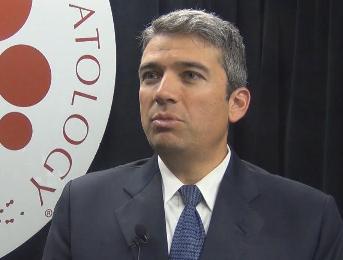Advertisment
ASH 2014 Video Interview by Esther Drain: Hodgkin Lymphoma: Prognosis and Therapy. Professor Ajay Gopal (University of Washington) discusses where we are with prognostic biomarkers and interim PET scans to direct therapy in HL

by Thomas R. Collins: Pursuit of useful risk biomarkers in HL still a work-in-progress. The quest for biomarkers in classic Hodgkin lymphoma, to determine which patients are at a higher risk of relapse and possible death, continues to be refined, but the clinical application of biomarkers has remained somewhat elusive, according to David Scott, PhD, a clinician-scientist and an expert in CHL gene expression at the Centre for Lymphoid Cancer at the British Columbia Cancer Agency.
He argued that what we actually need to change management is evidence that by changing treatment we can overcome this risk, going from prognostic biomarkers to biomarkers that are truly predictive.
The tumor microenvironment in CHL is a mélange of normal cells, molecules and blood vessels that surround tumor cells, marked by “cross talk” between the tumor cells and their surroundings. Examining the make-up of this microenvironment, researchers have found, can reveal insights into the nature of the disease. But turning those insights into clinically useful information has been a challenge to investigators for 30 years. To show the long road in trying to pinpoint a useful biomarker, Dr. Scott focused on the macrophage. Comparing whole tissue gene-expression profiling in CHL with profiles of purified cell populations, it’s been found that, for example, increased B-cell populations is associated with favorable outcomes and increased macrophage populations were associated with poor outcomes. (1) Several studies have reached similar conclusions. This was validated later in further studies of macrophages, but variations in antibodies used, and variations in the methodologies for counting macrophages, produced results with a wide range in the thresholds needed to stratify patients into risk groups.
Since then, some of that variability has been addressed, but it has been observed that while a macrophage increase is linked with poor outcome in advanced disease and in Epstein-Barr virus-negative disease, no such association has been found in EBV-positive disease or in limited-stage disease, Dr. Scott said. More robust use of gene expression to identify at-risk patients has been evolving, with investigators at Dr. Scott’s center formulating a scoring method using more than 20 genes, yielding a 29% absolute difference in the 5-year overall survival between the high- and low-risk groups. Even still, they have found that there are limitations on how useful these prognostications can be.
“I believe the data are clear that we no longer consider classical Hodgkin lymphoma as one disease in these sorts of studies. However, the elephant in the room is that all of these biomarkers have been developed in patients treated with ABVD (standard chemotherapy regimen of doxorubicin, bleomycin, vinblastine and dacarbazine). They are prognostic.” What clinicians really need are biomarkers that guide treatment. “Eventually I’m hoping we can move towards a tailored approach, where the application of molecular biomarkers at diagnosis will guide up-front treatment decisions, which can then be modified based on treatment response — a truly risk- stratified, response-adapted approach.”
(1) Steidl, Lee, Shah, et al. Tumor-associated macrophages and survival in classic Hodgkin’s lymphoma. N Engl J Med. 2010 Mar 11;362(10):875-85.
(2) Scott, Chan, Hong, et al. Gene Expression–Based Model Using Formalin-Fixed Paraffin-Embedded Biopsies Predicts Overall Survival in Advanced-Stage Classical Hodgkin Lymphoma. J Clin Oncol. Feb 20, 2013; 31(6): 692–700.





